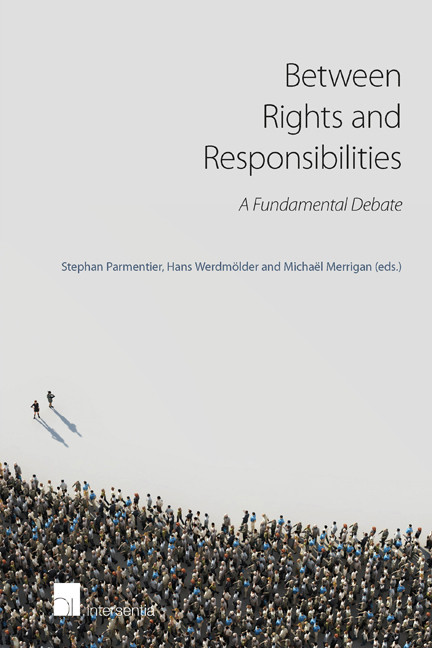Book contents
- Frontmatter
- Foreword
- Contents
- About the Authors
- Introduction: Towards an Integrated Vision of Rights and Responsibilities
- PART I FUNDAMENTAL RIGHTS AND FUNDAMENTAL RESPONSIBILITIES: SETTING THE SCENE
- PART II RIGHTS AND RESPONSIBILITIES IN SPECIFIC CONTEXTS
- Declaration of Human Duties and Responsibilities
Foreword
Published online by Cambridge University Press: 22 November 2017
- Frontmatter
- Foreword
- Contents
- About the Authors
- Introduction: Towards an Integrated Vision of Rights and Responsibilities
- PART I FUNDAMENTAL RIGHTS AND FUNDAMENTAL RESPONSIBILITIES: SETTING THE SCENE
- PART II RIGHTS AND RESPONSIBILITIES IN SPECIFIC CONTEXTS
- Declaration of Human Duties and Responsibilities
Summary
It is a pleasure for me to write the foreword to this book on rights and responsibilities.
As the editors note in their introduction, the book was inspired by a conference that took place some ten years ago, in Leuven, in the framework of the Summer Course on Human Rights. The Summer Course was organised annually by the University of Leuven and the Dutch Human Rights Research School. With the late Peter Baehr, Cees Flinterman, Hans Werdmölder, Stephan Parmentier, Wouter Vandenhole and others, I was part of the group that was responsible for the organisation of the event. I have the best memories of the many times that we sat together to prepare the course, of the many discussions with colleagues and students during the course, and of the many pleasant encounters with our loyal friends and lecturers from Northwestern University and the University of Notre Dame, Doug Cassel, Steve Sawyer and Barbara Fick. Writing this foreword brings back all these memories.
Michaël Merrigan later joined Stephan Parmentier and Hans Werdmölder as an editor of the book. A bright researcher, he is finishing his PhD research on fundamental duties and responsibilities. As Michael's promoter, I am closely following that research. It will no doubt bring again new insights to the topic covered by this book.
Fundamental responsibilities, and their relationship to fundamental rights, seem to have become more topical than ever. Where the relevance of fundamental rights is questioned, fundamental responsibilities are often presented as an alternative.
In fact, human rights have always been in a close relationship with fundamental responsibilities. In Article 29(1) of the Universal Declaration on Human Rights, it is proclaimed that ‘everyone has duties to the community in which alone the free and full development of his personality is possible’. It is true that such references are relatively rare in the subsequent international human rights treaties. But perhaps this can be explained by the simple fact that the stated aim of these treaties is to protect the individual against arbitrary action by the state, and that the drafters did not consider it necessary to repeat, in such a context, that the individual also has responsibilities vis-à-vis the state or others.
One could say that an individual's fundamental rights can only be fully understood against the background of his or her fundamental responsibilities.
- Type
- Chapter
- Information
- Between Rights and ResponsibilitiesA Fundamental Debate, pp. v - viPublisher: IntersentiaPrint publication year: 2016



